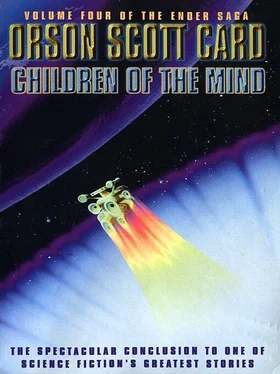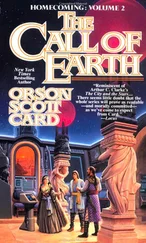Orson Card - Children of the Mind
Здесь есть возможность читать онлайн «Orson Card - Children of the Mind» весь текст электронной книги совершенно бесплатно (целиком полную версию без сокращений). В некоторых случаях можно слушать аудио, скачать через торрент в формате fb2 и присутствует краткое содержание. Жанр: Фантастика и фэнтези, на английском языке. Описание произведения, (предисловие) а так же отзывы посетителей доступны на портале библиотеки ЛибКат.
- Название:Children of the Mind
- Автор:
- Жанр:
- Год:неизвестен
- ISBN:нет данных
- Рейтинг книги:3 / 5. Голосов: 1
-
Избранное:Добавить в избранное
- Отзывы:
-
Ваша оценка:
- 60
- 1
- 2
- 3
- 4
- 5
Children of the Mind: краткое содержание, описание и аннотация
Предлагаем к чтению аннотацию, описание, краткое содержание или предисловие (зависит от того, что написал сам автор книги «Children of the Mind»). Если вы не нашли необходимую информацию о книге — напишите в комментариях, мы постараемся отыскать её.
Children of the Mind — читать онлайн бесплатно полную книгу (весь текст) целиком
Ниже представлен текст книги, разбитый по страницам. Система сохранения места последней прочитанной страницы, позволяет с удобством читать онлайн бесплатно книгу «Children of the Mind», без необходимости каждый раз заново искать на чём Вы остановились. Поставьте закладку, и сможете в любой момент перейти на страницу, на которой закончили чтение.
Интервал:
Закладка:
But the heart of Pacifica had always been and remained today the tropical islands of the ocean called Pacific in memory of the largest sea on Earth. The dwellers on these islands lived, not precisely in the old ways, but with the memory of old ways still in the background of all sounds and at the edges of all sights. Here the sacred kava was still sipped in the ancient ceremonies. Here the memories of ancient heroes were kept alive. Here the gods still spoke into the ears of holy men and women. And if they went home to grass huts containing refrigerators and networked computers, what of that? The gods did not give unreceivable gifts. The trick of it was finding a way to let new things into one's life without killing that life to accommodate them.
There were many on the continents, in the big cities, on the temperate farms, in the research stations -- there were many who had little patience with the endless costume dramas (or comedies, depending on one's point of view) that took place on those islands. And certainly the people of Pacifica were not uniformly Polynesian in race. All races were here, all cultures; all languages were spoken somewhere, or so it seemed. Yet even the scoffers looked to the islands for the soul of the world. Even the lovers of cold and snow took their pilgrimage -- a holiday, they probably called it -- to tropical shores. They plucked fruit from the trees, they skimmed over the sea in the outrigger canoes, their women went bare-breasted and they all dipped fingers into taro pudding and pulled fishmeat from the bones with wet fingers. The whitest of them, the thinnest, the most elegant of the people of this place called themselves Pacifican and spoke at times as if the ancient music of the place rang in their ears, as if the ancient stories spoke of their own past. Adopted into the family, that's what they were, and the true Samoans, Tahitians, Hawaiians, Tongans, Maoris, and Fijians smiled and let them feel welcome even though these watch-wearing, reservation-making, hurrying people knew nothing of the true life in the shadow of the volcano, in the lee of the coral barrier, under the sky sparked with parrots, inside the music of the waves against the reef.
Wang-mu and Peter came to a civilized, modern, westernized part of Pacifica, and once again found their identities waiting for them, prepared by Jane. They were career government workers trained on their home planet, Moskva, and given a couple of weeks' vacation before starting service as bureaucrats in some Congress office on Pacifica. They needed little knowledge of their supposed home planet. They just had to show their papers to get an airplane out of the city where they had supposedly just shuttled down from a starship recently arrived from Moskva. Their flight took them to one of the larger Pacific islands, and they soon showed their papers again to get a couple of rooms in a resort hotel on a sultry tropical shore.
There was no need for papers to get aboard a boat to the island where Jane told them they should go. No one asked them for identification. But then, no one was willing to take them as passengers, either.
"Why you going there?" asked one huge Samoan boatman. "What business you got?"
"We want to speak to Malu on Atatua."
"Don't know him," said the boatman. "Don't know nothing about him. Maybe you try somebody else who knows what island he's on."
"We told you the island," said Peter. "Atatua. According to the atlas it isn't far from here."
"I heard of it but I never went there. Go ask somebody else."
That's how it was, time and again.
"You get the idea that papalagis aren't wanted there?" said Peter to Wang-mu back on the porch of Peter's room. "These people are so primitive they don't just reject ramen, framlings, and utlannings. I'm betting even a Tongan or a Hawaiian can't get to Atatua."
"I don't think it's a racial thing," said Wang-mu. "I think it's religious. I think it's protection of a holy place."
"What's your evidence for that?" asked Peter.
"Because there's no hatred or fear of us, no veiled anger. Just cheerful ignorance. They don't mind our existence, they just don't think we belong in the holy place. You know they'd take us anywhere else."
"Maybe," said Peter. "But they can't be that xenophobic, or Aimaina wouldn't have become good enough friends with Malu to send a message to him."
At that, Peter cocked his head a bit to listen as Jane apparently spoke in his ear.
"Oh," said Peter. "Jane was skipping a step for us. Aimaina didn't send a message directly to Malu. He messaged a woman named Grace. But Grace immediately went to Malu and so Jane figured we might as well go straight to the source. Thanks Jane. Love how your intuition always works out."
"Don't be snide to her," said Wang-mu. "She's coming up against a deadline. The order to shut down could come any day. Naturally she wants to hurry."
"I think she should just kill any such order before anyone receives it and take over all the damn computers in the universe," said Peter. "Thumb her nose at them."
"That wouldn't stop them," said Wang-mu. "It would only terrify them more."
"In the meantime, we're not going to get to Malu by boarding a boat."
"So let's find this Grace," said Wang-mu. "If she can do it, then it is possible for an outsider to get access to Malu."
"She's not an outsider, she's Samoan," said Peter. "She has a Samoan name as well -- Teu 'Ona -- but she's worked in the academic world and it's easier to have a Christian name, as they call it. A Western name. Grace is the name she'll expect us to use. Says Jane."
"If she had a message from Aimaina, she'll know at once who we are."
"I don't think so," said Peter. "Even if he mentioned us, how could she possibly believe that the same people could be on his world yesterday and on her world today?"
"Peter, you are the consummate positivist. Your trust in rationality makes you irrational. Of course she'll believe we're the same people. Aimaina will also be sure. The fact that we traveled world-to-world in a single day will merely confirm to them what they already believe -- that the gods sent us."
Peter sighed. "Well, as long as they don't try to sacrifice us to a volcano or anything, I suppose it doesn't hurt to be gods."
"Don't trifle with this, Peter," said Wang-mu. "Religion is tied to the deepest feelings people have. The love that arises from that stewing pot is the sweetest and strongest, but the hate is the hottest, and the anger is the most violent. As long as outsiders stay away from their holy places, the Polynesians are the peacefullest people. But when you penetrate within the light of the sacred fire, watch your step, because no enemy is more ruthless or brutal or thorough."
"Have you been watching vids again?" asked Peter.
"Reading," said Wang-mu. "In fact, I was reading some articles written by Grace Drinker."
"Ah," said Peter. "You already knew about her."
"I didn't know she was Samoan," said Wang-mu. "She doesn't talk about herself. If you want to know about Malu and his place in the Samoan culture on Pacifica -- maybe we should call it Lumana'i, as they do -- you have to read something written by Grace Drinker, or someone quoting her, or someone arguing with her. She had an article on Atatua, which is how I came across her writing. And she's written about the impact of the philosophy of Ua Lava on the Samoan people. My guess is that when Aimaina was first studying Ua Lava, he read some works by Grace Drinker, and then wrote to her with questions, and that's how the friendship began. But her connection with Malu has nothing to do with Ua Lava. He represents something older. Before Ua Lava, but Ua Lava still depends on it, at least here in its homeland it does."
Читать дальшеИнтервал:
Закладка:
Похожие книги на «Children of the Mind»
Представляем Вашему вниманию похожие книги на «Children of the Mind» списком для выбора. Мы отобрали схожую по названию и смыслу литературу в надежде предоставить читателям больше вариантов отыскать новые, интересные, ещё непрочитанные произведения.
Обсуждение, отзывы о книге «Children of the Mind» и просто собственные мнения читателей. Оставьте ваши комментарии, напишите, что Вы думаете о произведении, его смысле или главных героях. Укажите что конкретно понравилось, а что нет, и почему Вы так считаете.







